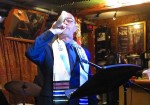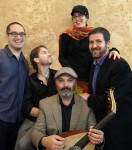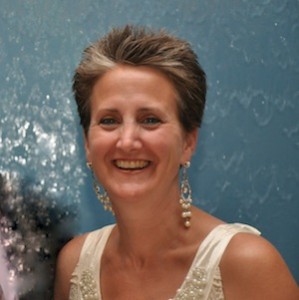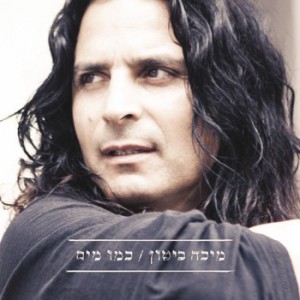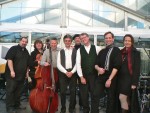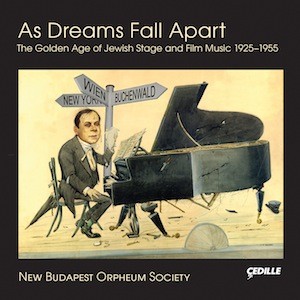Shtreiml and Ismail Fencioglu will play at the Vancouver Folk Music Festival, as well as concerts on Vancouver and Salt Spring islands. (photo from Vancouver Folk Music Festival)
Shtreiml and Ismail Fencioglu will be right at home among the top talent that will gather at the Vancouver Folk Music Festival July 17-19. As did their previous recordings, the group’s fourth CD, Eastern Hora, received critical acclaim – it also resulted in the band’s nomination as group of the year in the 2014 Canadian Folk Music Awards.
Shtreiml is composer, pianist and harmonica player Jason Rosenblatt; trombonist Rachel Lemisch, originally from Philadelphia, who met Rosenblatt at KlezKanada (the couple dated long-distance for a few years, marrying in 2004); drummer Thierry Arsenault; bassist Joel Kerr; and composer, oud player and vocalist Ismail Fencioglu, who harkens from Istanbul.
Rosenblatt met Fencioglu a couple of years after Shtreiml was formed. The two played together at Festival du Monde Arabe in 2004.
The festival’s artistic director, Joseph Nakhlé, is “very forward-thinking, and he wanted the festival to be “more inclusive and, of course, Jewish people have had a presence in the Arab world for thousands of years, so he wanted to have a Jewish group,” Rosenblatt told the Independent in a phone interview from Montreal. While Shtreiml is not a Mizrahi or Sephardi group by any stretch, he said, Nakhlé wanted to add another element of the Middle East, “so he introduced us to Ismail, and we started this collaborative project.
“The first concert, we played all traditional tunes … traditional Jewish or traditional Turkish melodies, and we’ve just been working ever since at creating our own music. He writes music for the group, I write music for the group, and we created this hybrid sound.”
Rosenblatt attributes the success of Shtreimel to several factors. “First of all, I think when we perform live, it’s engaging in the sense that … you have the instrumentation that people don’t see very often … it’s instruments that people aren’t necessarily familiar with … so, to see someone from Turkey playing the oud and also singing in a style (microtonal), getting the notes in between the notes, I think that’s interesting.”
Another factor, and Rosenblatt said he never thought he would describe the band in this way, but “people like to see an Orthodox Jew and a Muslim playing together. He’s a secular Muslim and I don’t make a secret that I’m an Orthodox Jew, I wear kippa on stage, but I think there’s something heartwarming about it.” The two have been friends for a long time now, and they still get along really well, said Rosenblatt.
And, of course, there’s the music. “We try to stay away from cliché compositions … and, if we do play something that’s super-traditional, we try to add our own flavor, our own spin on it.”
Rosenblatt grew up in a musical family.
“Jewish music was always in the house,” he said, “but the main form of music that my parents listened to was folk and blues, early jazz, that type of thing. But we always had klezmer greats, Dave Tarras, Naftule Brandwein, somewhere in the background; Yossele Rosenblatt [no relation] from cantorial music, my grandmother sang Yiddish folk songs. But my main love of music was – I was influenced by my parents to get into – blues and early jazz.”
Rosenblatt’s dad is a doctor but he plays guitar, and he would play for the kids when Rosenblatt was growing up. His mother is a folksinger, Abigail Rosenblatt, with recordings of her own, and she has accompanied Rosenblatt’s bands on various occasions and on recordings. He has four siblings, who all played an instrument when they were growing up, but did not choose music as a profession, or at least not their main profession, as one of his brothers, Eli, who is a lawyer, has made recordings.
Rosenblatt grew up singing in synagogue, leading services; he took piano lessons. He said he picked up his first harmonica when he was 15 years old because his dad had a bunch lying around. He thought that “Oh Susannah” might have been his first tune, then his parents gave him a tape of Sonny Terry and Brownie McGhee, “an African-American duo that were big in the ’30s, and then, with the folk music revival of the 1960s, a bunch of white, Jewish people rediscovered all these amazing African-American musicians, and it kind of brought them out of retirement. While these guys were out of style for the black community, for these young Jewish people that were rediscovering blues-roots music, these guys became stars again.”
Later, when Rosenblatt started getting into the electric harmonica and Chicago blues, his parents gave him other records to inspire him, Paul Butterfield Blues Band, for example.
While he majored in economics, many of his undergraduate credits were in music, he said, and, during his subsequent MBA, he was still playing weddings and other gigs.
He headed to Israel for about five years, in the latter half of the 1990s, to work in software design. It was an educational multimedia firm, he said, “so they had these various videos and diagrams explaining certain things, historical tours, they did different projects. One of them was the genius of Edison, and Leonardo da Vinci, so they explained various inventions and each invention that was being explained was in a video and I was doing the music for those videos, and then, at night I would play [music] in bars.”
In terms of college-level music instruction, Rosenblatt said he had “one year of serious music education,” the rest was on his own and through mentors, such as Howard Levy, a well-known harmonica player.
“I studied European music at the Rimon School of Jazz [and Contemporary Music] in Israel,” he said. “Then, toward my mid 20s, I started getting into Jewish music a little more seriously, the roots of Jewish music, klezmer and cantorial music, through an organization called KlezKanada…. And I really got into listening again to klezmer greats, trying to apply the repertoire, the ornamentation, etc., to the harmonica, and also to the piano.
“Out of that experience of learning these tunes,” he continued, “I needed some sort of outlet and I formed a band called Shtreiml…. I formed it with Josh Dolgin, who’s known as Socalled … and it started off as a young group playing traditional klezmer music with somewhat untraditional instruments because I was playing harmonica, my wife was on trombone, Josh Dolgin was on accordion, and then we had bass and drums. The group kind of morphed, we played traditional repertoire, to a certain degree, until we felt we couldn’t take the repertoire much further. Then, I started writing a bunch of new material, Jewish instrumental music based on traditional modes, using traditional ornamentation and improvisation, and that’s how the band started.”
As to his compositions, Rosenblatt said, “I listen to a lot of music and I come up with ideas. I don’t just compose in the Jewish realm, I also … have a new album coming out of ragtime and jazz, and not just instrumental music but vocal music as well…. Especially with regards to the Jewish material, I saw a need for it because we were researching a lot of old klezmer tunes and we kind of got tired of always having to research and look for something old, why not create something new? We always say that we have great new music that has a reverence for the past.”
Eastern Hora follows Harmonica Galitzianer (2002), Spicy Paprikash (2004) and Fenci’s Blues (2006). Between Eastern Hora and Fenci’s Blues, Rosenblatt was working with a group called D’Harmo, “and I came out with an album with them, I was working quite a bit with them. I was doing another project, called Jump Babylon, which is a Jewish rock project. It’s difficult, we are self-managed, in other words, I manage everything…. So, to try to do projects simultaneously, especially recording projects, it’s difficult, so that’s the reason for that gap in recordings for Shtreiml because I was doing other things in between [including his continuing role as artistic director of the six-year-old annual Montreal Jewish Music Festival, which will take place in August]. But that doesn’t mean that the band was on hiatus. We were still performing and, since the new record came out, I’ve been putting a lot of emphasis on trying to book the group because it’s fun and we get along, it’s fun to tour together. I think also that the playing of the group matured quite a bit between 2006 and 2014, and I think audiences see that the compositions are little more complex and I think our stage presence is better.”
Shtreiml and Fencioglu will be doing four gigs in British Columbia. He and Lemisch are bringing the whole mishpocha with them: four kids, 7, 5, 3 and seven months. “I’m looking forward to coming to Vancouver, it’s our second time. We were there last year for a wedding…. We have what we call functional music and then we have original music, and so we’re excited to be playing our artistic project for what I know is going to be an appreciative audience because whenever we go to folk festivals, it’s always people are there because they want to hear music.”
Shtreiml and Ismail Fencioglu will be at the Vancouver Folk Music Festival July 17-19, Congregation Emanu-El in Victoria July 15, Vancouver Island Musicfest in Comox July 10-12 and Fulford Hall on Salt Spring Island July 9.
 For those who are not willing or able to bring themselves to participate in – or even watch – Shabbat or holiday services online, the CD is a nice compromise. That is, if you like jazz. With the exception of a mostly traditional rendition of Kol Nidre and Ashamnu, the prayers are full-on jazz, though many regular attendees at a non-Orthodox synagogue that has a cantor and/or choir will recognize most of the main melodies and be able to sing along.
For those who are not willing or able to bring themselves to participate in – or even watch – Shabbat or holiday services online, the CD is a nice compromise. That is, if you like jazz. With the exception of a mostly traditional rendition of Kol Nidre and Ashamnu, the prayers are full-on jazz, though many regular attendees at a non-Orthodox synagogue that has a cantor and/or choir will recognize most of the main melodies and be able to sing along.
